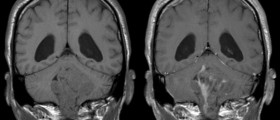Loading...
Loading...
Hi i had large mallignant tumor removed from my cerebellum in feb this year. And i have dizziness and sometimes nausea. I take salvestrol plant based tablets. Please google them. They are a big help for brain tumor patients. Xx
Loading...
Loading...
Loading...
Hi I had a very large frontal lobe type 2 Meningioma and a small piece on top of my brain was left due to blood vessel that where too sensitive to operate on . I'm on my day 5 of radiation treatments. And after working in the yard later that day felt dizzy while driving and once I go to my place to park things got worse and worse with server dizzyness sweating nausea until I called 911 and was seen in the hospital. Diagnosis was vertigo. Got meds but have not filled the RX yet and now it's coming back. The Ativan they gave me at the hospital helped . The two mes they sent me home with the RX for didn't work at the hospital. I hope they work when I get them.
Brain Tumors suck!
Loading...
Loading...
Loading...
Loading...
Post-surgery vertigo and dizziness can have various causes, and here are a few possible factors that can contribute to post-surgery vertigo and dizziness:
1. Anesthesia: General anesthesia used during surgery can have side effects, including dizziness or lightheadedness. These symptoms typically resolve as the anesthesia wears off.
2. Inner ear disturbance: Surgery near the head or neck region, particularly if it involves the inner ear structures, can disrupt the delicate balance mechanisms in the inner ear. This disruption can lead to vertigo or dizziness.
3. Medications: Certain medications prescribed after surgery, such as pain medications or antibiotics, can have side effects that include dizziness or lightheadedness.
4. Positioning during surgery: The positioning of the body during surgery can affect blood flow and cause temporary changes in blood pressure, leading to dizziness or lightheadedness post-surgery.
It's important to communicate your symptoms to your healthcare provider, as they can evaluate your specific situation and provide appropriate recommendations. They may conduct further evaluations or refer you to a specialist, such as an otolaryngologist (ear, nose, and throat specialist) or a neurologist, for further assessment and management.
What have your doctors told you?
